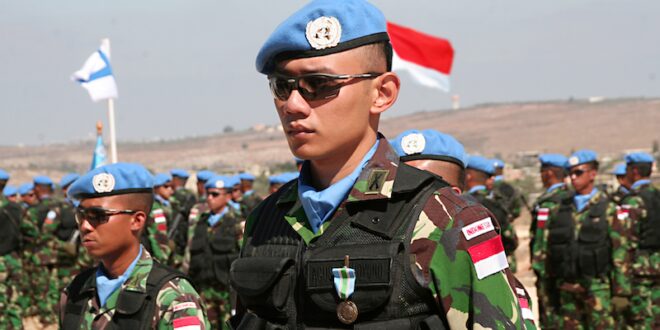The mandate of the UN Interim Force in Lebanon (UNIFIL) is due to expire at the end of August. The Security Council is expected to debate the situation on the Lebanese-Israeli border shortly, and to renew UNIFIL’s mandate. As for the situation on the border, it is best described as volatile.
In early May, a tent appeared more than 100 feet south of the Blue Line, the contentious border monitored by UNIFIL. UN forces observed individuals repeatedly crossing from Lebanon into the contested area. By June 17, a second tent was spotted, and UNIFIL asked the Lebanese army to remove them. One was taken down, the other stayed.
The unstable situation along the border is kept under constant review. The Lebanese and Israelis hold a UNIFIL-chaired meeting every five to six weeks to discuss military issues, including violations along the Blue Line. The arrangements are egg-shell fragile. No media are allowed; the generals do not shake hands; the food is provided by the Italian UNIFIL contingent – and, to avoid suspicions of any sort, even the bottled water is Italian.
UNIFIL spokesman Andrea Tenenti described the scene as “two sides sitting in a very small room, on very uncomfortable chairs.”
The fact that the meetings take place regularly, and that there have been 17 years of relative stability is, to Tenenti, a sign that neither side has an appetite for conflict. “Both sides are in a way keen to solve the contentious issues,” he said, “but everyone wants to solve it in their own way.”
Meanwhile within Lebanon the Hezbollah organization continues to wield its huge military power in support of its Iranian paymasters. With help from Iran’s IRGC (Islamic Revolutionary Guard Corps), Hezbollah in engaged in retrofitting old missiles with guidance systems and building new precision-guided missiles. In December 2018 Israel discovered and sealed tunnels dug from Lebanon under the Blue Line for the express purpose of carrying out attacks within Israel.
Since then Hezbollah has fired antitank missiles at an Israeli military ambulance, launched a drone at an Israeli offshore gas platform, and allowed Hamas to fire rockets at Israel from Hezbollah-controlled areas in Lebanon.
On August 9 a Hezbollah arms truck overturned on the mountainous road leading through the Christian town of Kahale in Lebanon. To prevent residents from seizing the truck and its contents, Hezbollah personnel on board opened fire, killing a Kahale resident and wounding another. A shoot-out followed, and one Hezbollah member was also killed.
Just a few weeks ago the respected Washington Institute published a devastatingly frank assessment by its counterterrorism and intelligence academic expert, Matthew Levitt, concerning the deep-rooted troubles that are paralyzing Lebanon.
“Let’s be clear,” he writes, “corruption is at the heart of Lebanon’s economic and political crises. This economic and political rot is deeply entrenched and is protected by powerful political bosses across the spectrum… yet no Lebanese party presents a greater security threat to Lebanon domestically, and to its neighbors in the region, than Hezbollah – in part because Hezbollah is the de facto militant enforcer of the corrupt political system from which it and other sectarian political parties benefit.”
There could be no greater evidence of Hezbollah’s overwhelming power within the state than its success in frustrating all attempts to investigate the circumstances surrounding the devastating explosion in Beirut port in August 2020.
Time and again when evidence emerged pointing the finger at one or other Hezbollah figure, the investigation was frustrated. Once the investigating judge was dismissed; at other times individuals summoned to appear refused to attend the court; time and again the investigation has been subject to appeals.
It became crystal clear that the Hezbollah-supporting members of the government were deliberately thwarting the investigation. With two judges pointing the finger at certain Hezbollah-supporting ministers and officials, the suspicion must arise that leading national figures were involved in the circumstances leading to the explosion. Meanwhile the investigation has stalled, while the UN Human Rights council calls in vain for its speedy conclusion.
These circumstances mirror the enormously protracted judicial proceedings to establish the facts behind the assassination of Lebanese politician, Rafik Hariri, on February 14, 2005. Obfuscation, the murder of an investigator and the non-appearance of named Hezbollah witnesses resulted in the inquiry lasting 16 years, and the eventual conviction in absentia of Hezbollah operatives.
The Lebanese population is well aware of the venality at the heart of its society. Back in November 2022 the Washington Institute commissioned a poll to assess the public’s opinion of the situation. Ninety-seven percent of respondents said the Lebanese government was doing too little in response to three key economic concerns. First, reduce the level of corruption in economic and public life. Second, meet people’s needs for an acceptable standard of living. And third, address the burden of taxes and other obligations in a fair way.
“Unfortunately,” observed Levitt, “Lebanese political bosses’ prescription for addressing such concerns is not political or economic reform, but doubling down on their respective power and patronage systems.”
Lebanon has been without a president since Michel Aoun’s term ended on 31 October 2022, with opposing political blocks unable to agree on a compromise candidate. The presidential vacuum is compounded by the fact that Lebanon’s government remains in caretaker status.
The last attempt to set up a presidential election was on June 14. Neither of the two candidates—Jihad Azour and Suleiman Frangieh—received sufficient votes in the first round. To win, a candidate needs a two-thirds majority (86 votes) of the elected parliamentarians, so a quorum of 86 members of parliament is necessary for a valid ballot. On 14 June, after the first session members from Hezbollah and its allied Amal Movement withdrew, leaving parliament without the necessary quorum and preventing a second round from taking place.
Beset by venality, corruption and self-interest at every level — political, economic and social — and with no obvious means of regeneration, Lebanon teeters on the brink of collapse into chaos.
 Eurasia Press & News
Eurasia Press & News




